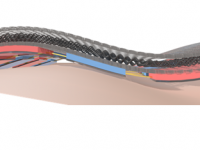Adaptive Textiles Technology

Technology Description:
The University of California, San Diego (UC San Diego) will develop smart responsive garments that enable building occupants to adjust their personal temperature settings and promote thermal comfort to reduce or eliminate the need for building-level air conditioning. The essence of building energy savings in UC San Diego's approach is based on the significant energy consumption reduction from the traditional global cooling/heating of the whole room space. This is done via localized cooling and heating only in the wearable structure in the very limited space near a person’s skin. This smart textile will thermally regulate the garment’s heat transport through changes in thickness and pore architecture by shrinking the textile when hot and expanding it when cold.
Potential Impact:
If successful, DELTA technology could increase energy efficiency, reduce emissions produced by powering traditional HVAC systems, and enable more sustainable heating and cooling architectures for energy-efficient building design.
Security:
The innovations developed under the DELTA program have the potential to increase energy efficiency, improve overall building performance, and reduce residential or commercial HVAC energy consumption by at least 15%.
Environment:
The heating and cooling of buildings generates about 13% of U.S. domestic greenhouse gas emissions. Through improved utilization of energy produced by fossil fuels with full adoption DELTA could reduce these emission by 2%.
Economy:
DELTA program innovations can help U.S. businesses eventually reduce reliance on tightly controlled building environments, thus enabling radical and sustainable architecture in next generation energy-efficient building designs.
Contact
ARPA-E Program Director:
Dr. Jennifer Gerbi
Project Contact:
Prof. Joseph Wang
Press and General Inquiries Email:
ARPA-E-Comms@hq.doe.gov
Project Contact Email:
josephwang@ucsd.edu
Partners
Electrozyme, LLC
Related Projects
Release Date:
04/29/2014
